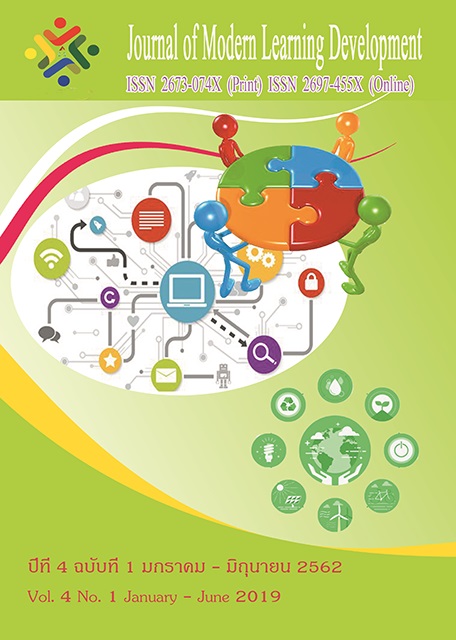Leadership Principles With Quality Team Building Processes
Main Article Content
Abstract
This article is an article that reflects the leadership that has a quality team building process, where the leader is the person who has been appointed or regarded as the leader and the decision maker. Because it is capable of supervising And will take subordinates Or people in a way that is good or not, with a type that can be analyzed according to By adhering to 2 criteria as follows: 1) considering the use of power 2) considering the work philosophy classified into 4 methods of study, which is the first method, studied by the leader who has acquired the power, the second method studied by the leader Power. The third method studied from the role that the leader expressed. The fourth method studied from the acquisition of positions.
Good leadership features Should consist of the following important characteristics: 1. Knowledge 2. Initiative 3. Courage 4. Decisiveness 5. Justice 6. Patience 6. Enthusiasm 6. Unselfishness 6. Compassion 10. Loyalty 11. Self-control
Creating a team working process is the ability to drive or influence others to achieve individual or group goals. Where the leader must have a method of performing duties to be a leader in team building By the duty of the leader Will have to do 2 types of duties, namely the main duties and duties Such a process, the leader must have a finer way of thinking in creating a team, namely: 1. Being a planning of the operation 2. Being a manager of the group 3. Being the policy maker 4. Being an expert 5. Being an educator 6. Being 6. The judge chooses the objectives of the group to achieve the work. Or members in the group to achieve work. 6. Being a supervisor. 10. Being a job appraiser.
Article Details
References
กิติ ตยัคคานนท์. (2537). เทคนิคการสร้างภาวะผู้นำ. (พิมพ์ครั้งที่ 10). กรุงเทพมหหานคร: บัตเตอร์ฟลาย.
จิรพรรณ กาจนะจิตรา. (2528). การพัฒนาชุมชน. กรุงเทพมหานคร: ชวนพิมพ์.
จุมพล หนิมพานิช. (2537). ความเป็นผู้นำ เอกสารการสนชุดวิชาความรู้เบื้องต้นเกี่ยวกับการบริหาร, สาขาวิชาวิทยาการจัดการ มหาวิทยาลัยสุโขทัยธรรมาธิราช. นนทบุรี : สำนักพิมพ์มหาวิทยาลัยสุโขทัยธรรมาธิราช.
ชาญชัย อาจินสมาจาร. (2550). ภาวะผู้นำในองค์การ. กรุงเทพมหานคร: บริษัทพิมพ์ปัญญาชน.
เถาวัลย์ นันทาภิวัฒน์. (2521). หลักการจัดการ. กรุงเทพมหานคร: สัมนักพิมพ์แห่งจุฬาลงกรณ์มหาวิทยาลัย.
น้อย สุปิงคลัต. (2528). ภาวะความเป็นผู้นำในงานพัฒนาชุมชน. กรุงเทพมหานคร: ชวนพิมพ์.
พรนพ พุกกะพันธุ์. (2544). ภาวะผู้นำและการจูงใจ. กรุงเทพมหานคร: จามจุรีโปรดักท์.
พระธรรมโกศาจารย์ (ประยูร ธมฺมจิตฺโต). (2549). พุทธวิธีบริหาร. กรุงเทพมหานคร: มหาจุฬาลงกรณราชวิทยาลัย.
พระพรหมคุณาภรณ์ (ป.อ. ปยุตฺโต). (2546). ภาวะผู้นำ : ความสำคัญต่อการพัฒนาคน พัฒนาประเทศ. กรุงเทพมหานคร: ธรรมสภา.
พระราชวิจิตรปฏิภาณ (สุนทร ญาณสุนฺทโร). (2550). ยอดแห่งผู้นำ. กรุงเทพมหานคร: สำนักพิมพ์ธรรมสภา.
ภิญโญ สาธร. (2526). หลักการบริหารการศึกษา. กรุงเทพมหานคร: โรงพิมพ์คุรุสภา.
รังสรรค์ ประเสริฐศรี. (2544). ภาวะผู้นำ. กรุงเทพมหานคร: ธนธัชการพิมพ์.
วาสนา สุขประเสริฐ. (2547). ภาวะผู้นำของผู้บริหารสตรีโรงเรียนประถมศึกษา สังกัดสำนักงานการประถมศึกษาจังหวัดยโสธร. วิทยานิพนธ์ครุศาสตร์มหาบัณฑิตสาขาบริหารการศึกษา. บัณฑิตวิทยาลัย: มหาวิทยาลัยราชภัฎอุบลราชธานี.
สุดา สุวรรณณาภิรมย์. (2551). ภาวะผู้นำ The Leadership. กรุงเทพมหานคร: บริษัท เอ อาร์.อินเฟอร์เมชั่น แอนด์ พับลิเคชั่น จำกัด.
สุธีระ ทานตวณิช. (2521) การบริหารการศึกษา.ชลบุรี: มหาวิทยาลัยศรีนครินทวิโรฒ บางแสน.
สุเมธ เดียวอิศเรศ. (2527). พฤติกรรมผู้นำสถานศึกษา. กรุงเทพมหานคร: โรงพิมพ์วัฒนาการพิมพ์.
อรุณ รักธรรม. (2522). การพัฒนาองค์การเพื่อการเปลี่ยนแปลง. กรุงเทพมหานคร: ไทยวัฒนาพานิช.
Burdy J. Raymond. (1972). Fundamental of Leadership Readings. Massachusetts Addison: Wesley Publishing Co.
Emory S. Bogardus. (1934). Leaders and Leadership. New York: Appleton-century-Croffs.
Frankin Covey. (1999). The Four Roles Leadership. USA: Frankin Covey Co., Ltd.
Rensis Likert. (1967). The Human Organization. New York: McGraw – Hill..


